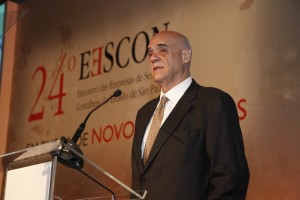When Luiz Inácio Lula da Silva won the elections in 2002, economist Bernard Appy went to the government with a mission that time has proved to be thorny: to carry out tax reform. It implemented several measures that aired tax collection, but it left in 2009 without changing the country's major tax distortions.
Appy is now preparing to start a new phase. He is leaving LCA Consultores, a company he helped create and whose partner is Luciano Coutinho, the president of the National Bank for Economic and Social Development (BNDES).
"I'm going to provide public management consultancy, but I'm not going to the government and I'm thinking if I start a company," he says. He is also concerned with changing the tax and fiscal structure of the country. He made contributions to the presidential candidates. “Our standard of fiscal policy is a low-growth trap,” he adds.
Below are the main excerpts from the interview he gave to the State.
What reforms should the next government adopt as a priority?
For my training, certainly the tax reform and, within it, I think the ICMS (Tax on Goods and Services) is an important topic, which also involves the fiscal war. Another issue is that states still tax investment. But I have no proposals, I have principles. We have to harmonize taxation. Personally, I think you have to relieve formal work in large companies - having more large companies with formal employees is good for the country to grow; reform the PIS / Cofins (social contributions); rethink the taxation of micro and small companies. It has a reasonable agenda. It will not be possible to do it in a single government, but the objective is to make the country more efficient.
Government enters and government leaves, everyone says that tax reform is necessary, but it does not happen.
I think we are maturing. The chance of being done is much greater now. In the case of the ICMS, with regard to the tax war, there is a greater degree of maturity in the discussion that can legalize the granting of tax benefits.
Proponents of the fiscal war say it improves the distribution of companies across Brazil. Wouldn't that make this distribution difficult?
The tax benefit began to be given in the 80s by the poorest states, but it became widespread. What's the problem? Example: São Paulo provides benefits to wheat milling companies, but Rio Grande do Sul produces wheat. The milling industry should not be in São Paulo. It should be in the South. Rio Grande do Sul, in turn, provides an incentive to attract the GM automaker, which should be in São Paulo. What is the final effect? I have raw wheat leaving the South and going to São Paulo, when noodles should be leaving. And I have auto parts leaving São Paulo to the South, and a car ready to go back to São Paulo. A huge part of the incentives ends up becoming a cost of logistics, the State does not exploit its vocations and still induces the creation of an inefficient productive structure in the country. Another question: everyone asks why Brazil is expensive. There is a reason. I'm not saying that I don't have to have a regional development policy. On the contrary. The whole discussion of tax reform goes through this. If you look at international literature, you will see that the best regional development policy is to provide infrastructure for the State. If it reduced the cost of logistics it would have an automatic impact. The companies would go to the States with cheaper labor.
Mr. you already mentioned that a lot goes through Congress and causes damage that most people don't even know. Mr. have any example?
A recent example was the change in the Law of Simple. For some segments, greater benefits were defined. A lawyer who establishes himself as a Simples company and has a revenue of up to R $ 180 thousand per year, R $ 15 thousand per month, will pay 4,5% tax on his revenue. It looks good, but what's wrong with that? He will pay much less tax than a lawyer with the same income employed in a large law firm. According to the table, his rate is 27,5%. The cost of this formal employee exceeds 40% in total. They are inducing two things with this change in Simples. They lead employees to form themselves artificially as a company, what is called 'pejotização'. Is very bad. Soon there will be someone from the IRS questioning. It also induces the lawyer to leave the company and set up a small, tiny office where he works alone, often less efficiently. What happens? We created a gap between the microentrepreneur and the formal employee of a large company. And this gap prevents the small ones from growing. The joke that if Microsoft had started in Brazil it would still be in a garage fund is true. Our tax system means that whoever starts in the garage fund stays there forever.
Because of the tax?
Yes. Because of the tax difference. I am not saying that the small does not have to be less taxed. Obviously it has. But we need a harmonic system. You cannot default to billing. I'll give you an example. A restaurant is in the first strip of Simples, R $ 180 thousand per year. The owner must have an income of about 10% of this, R $ 1,5 thousand per month, maximum R $ 3 thousand. Now, I treat the owner of the restaurant like the lawyer who has the same income. But the lawyer doesn't have to buy food, pay employees like a restaurant owner. I need a system that makes a difference in terms of income and encourages companies to grow. The tax burden will increase with the growth of the company, but not making leaps.
Reduce tax burden off the radar?
Reducing the burden is not a matter of the tax structure. It is a matter of fiscal policy (a policy that defines how the government collects and spends). In the short term, I don't see how to do it. On the contrary: my fear is that in the short term we will have an increase in the tax burden to close the accounts. In the long run, it may have space again. If you want, I have another theme.
Which?
Another issue of great concern in Brazil - very much so - is the design of fiscal policy. We have a structure with enormous rigidity in spending. A civil servant cannot be fired, any number of funds are earmarked to finance this or that. What's the problem? When you have periods of growth, the revenue grows above the GDP (Gross Domestic Product), the State creates new rigid expenses and still meets the primary surplus target. When the downturn comes, revenue drops. How does it adjust? You can adjust for a time by reducing the primary surplus, as is being done now, but it has a limit. How do you break down the rigid expenses you created? You don't dismount. And how does it work? Cutting investment and raising tax burden. This cycle has been repeated in Brazil since the 1988 Constitution. Now they have decided that 75% of the pre-salt revenue goes to education and 25% to health. When the price of oil is good, I will raise more and spend more. But then the price of oil falls, revenue falls, but I have a fixed expense. How to do? It has now been decided to allocate 10% of GDP to education in the National Education Plan. You have nowhere to take this feature. There is not. It is implicit in the goal that will have an increase in the tax burden - but no one has discussed this in Brazil.
Mr. would you dismantle those obligations?
Ideally, yes, but of course you can't do it all at once. You can change the formula. Instead of saying X% of my income goes to education, I can say that I will spend the same amount as last year, adjusted for inflation, and then discuss what I will increase in the margin.
Mr. talked to any candidate about it?
Not about that.
Did you talk about other things?
I gave the candidates some suggestions for changing tax policy. Although it is very difficult to discuss this technically during the campaign. It is an arid theme. But at the beginning of next year, the chance to define something in this area is great.
Mr. Did you also discuss this tax proposal with the candidates?
No. It doesn't stand a chance in time of election. It's the opposite. People are promising more: Marina (Silva) said she will give 10% of the gross revenue for health. Aécio (Neves), who will maintain the minimum wage adjustment policy. At this time only kindness is done.
As it is, will the government have to increase the tax burden or will it be able to maintain it?
Everyone knows that a fiscal adjustment will have to be made at the beginning of the next government. It's done. Personally, I can't see how to make a short-term adjustment without increasing the tax burden. The other option, which I consider the best: credibly signal that you will have a policy of containing expenses throughout the term, so that in the end you will be in a more balanced fiscal situation.
In that case, wouldn't you need to lift the load?
Part of the adjustment process includes raising damped prices - mainly electricity and fuels. When you do, it has an effect similar to an increase in tax burden. And there is a third option, which is to deal with issues that have a structural impact on tax: social security. There is change that can be done and it has a long-term impact, it signals a sustainability that gives space to manage fiscal policy in the short term. But, if the government wants to continue spending a lot, use 10% of the revenue for health, 10% of the GDP for education, then it will have to increase the tax burden. All kindness has a price. It will be difficult for the Minister of Finance in the next government.
Source: O Estado de S.Paulo
Click here and read the full article
 ETCO articulates mobilization to end the fiscal war. Idea is to form a parliamentary base from the states that granted incentives to keep the topic on the agenda later this year
ETCO articulates mobilization to end the fiscal war. Idea is to form a parliamentary base from the states that granted incentives to keep the topic on the agenda later this year





